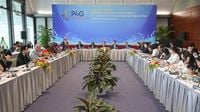On April 17, 2025, Minister of Agriculture and Rural Development Đỗ Đức Duy chaired a ministerial discussion titled "Embracing the Green Revolution 4.0: A Journey to Transform Food and Food Systems for a Sustainable Era" during the P4G Conference. This discussion highlighted the critical role of innovation, the application of digital technology, green technology, and multilateral cooperation in creating a sustainable and equitable future for humanity.
Minister Đỗ Đức Duy pointed out that Vietnam is facing numerous challenges, including increasingly severe climate change, rapid biodiversity decline, disruptions in the global food supply chain due to geopolitical instability, the rise of protectionism, threats to food security, and a widening development gap between countries. He emphasized, "We cannot solve the climate crisis by creating a food crisis. We cannot protect the environment if we forget the small-scale farmers. We cannot ask low-income countries to preserve environmental resources sustainably if the world does not share responsibility and benefits fairly."
Vietnam's agriculture plays a significant role in ensuring food security, social stability, and livelihoods for over 60% of the population, contributing 12% to the national GDP. Despite its success, the country has only about 10.3 million hectares of arable land available for agriculture, which poses significant challenges.
"We cannot have a prosperous agriculture if natural resources continue to be threatened, if the land continues to degrade, and if the climate continues to warm," Minister Đỗ Đức Duy stressed. To tackle these challenges, Vietnam is gradually transforming its agricultural sector towards green, smart, and sustainable practices. This transformation focuses on research, the application of modern science and technology, and digital transformation.
Vietnam has issued several strategic plans, including the Strategy for Sustainable Agriculture and Rural Development for the period 2021-2030 with a vision to 2050, the National Action Plan for Transforming Transparent, Responsible, and Sustainable Food Systems to 2030, and projects aimed at promoting the circular economy in agriculture.
Minister Đỗ emphasized that no country can achieve success in transforming food systems alone. This journey requires collaborative action among nations, international organizations, businesses, scientists, and farmers. Effective multilateral cooperation based on fairness and mutual respect is essential to overcoming the significant challenges of food security, biodiversity, climate change, and sustainable development.
He called on partners to share policies that promote the application of technology and innovation in agricultural production to use resources effectively, enhance productivity and quality, and especially reduce emissions. This approach is crucial for the agricultural sector to adapt to climate change while contributing to the net-zero emissions goal that many countries are striving for.
In addition, the role of regulatory agencies, international organizations, and the private sector in technology transfer, financial support, and capacity building for farmers is paramount. Close and comprehensive coordination among all parties is a prerequisite to ensuring the effectiveness and sustainability of transformation programs.
At the conference, Donal Brown, Vice President of the International Fund for Agricultural Development (IFAD), remarked that the theme "Embracing the Green Revolution 4.0" is not just a call for innovation but a rallying cry for action, demonstrating the government's vision and leadership in the face of unprecedented challenges. He noted that producing more with fewer resources is a pressing issue for many countries, and technology is the optimal solution. The application of biotechnology can help develop crop varieties that are more resilient to climate change.
In Ethiopia, a country that has made strides in food production, the "Bounty of the Basket" initiative focuses on animal-based proteins, with a breakthrough solution being the use of biogas to reduce greenhouse gas emissions in livestock farming. Ethiopian Minister Girma Amente shared that the conference provides a platform for the world to transform food systems and build a sustainable future together.
He highlighted the need for responsibility in disseminating technology, techniques, and innovative practices to promote sustainable transformation. Ethiopia’s climate goals emphasize reducing emissions, conserving forest carbon stocks, and implementing climate-smart agricultural practices.
In the context of climate change, resource depletion, and rising food demand, transforming food systems towards green, digital, and sustainable practices is no longer an option but a necessity. According to Nguyễn Đình Thọ, Deputy Director of the Institute of Agricultural and Environmental Strategies and Policies, national policies are gradually being refined to promote the application of technology and innovation in agriculture.
Vietnam has issued its Green Growth Strategy, Digital Transformation Strategy for Agriculture, and programs to promote circular and low-carbon agriculture. Regulatory agencies and international organizations play crucial roles in the green transition and the digital transformation of sustainable agricultural ecosystems.
Thọ emphasized that multilateral cooperation and sharing knowledge, finance, and technology are essential to overcoming barriers related to costs, capacity, and market access. Organizations such as FAO, IFAD, UNDP, ADB, and GCF are partnering with Vietnam to transfer technology, enhance farmers' capacities, and promote public-private partnerships in sustainable agriculture.
From the practical experiences of localities in Vietnam and many countries, successful models of green agriculture have emerged. "Success in green and digital transformation shows that when farmers are equipped with tools, knowledge, and confidence, they become the pioneers of the green agricultural revolution," Thọ concluded.


